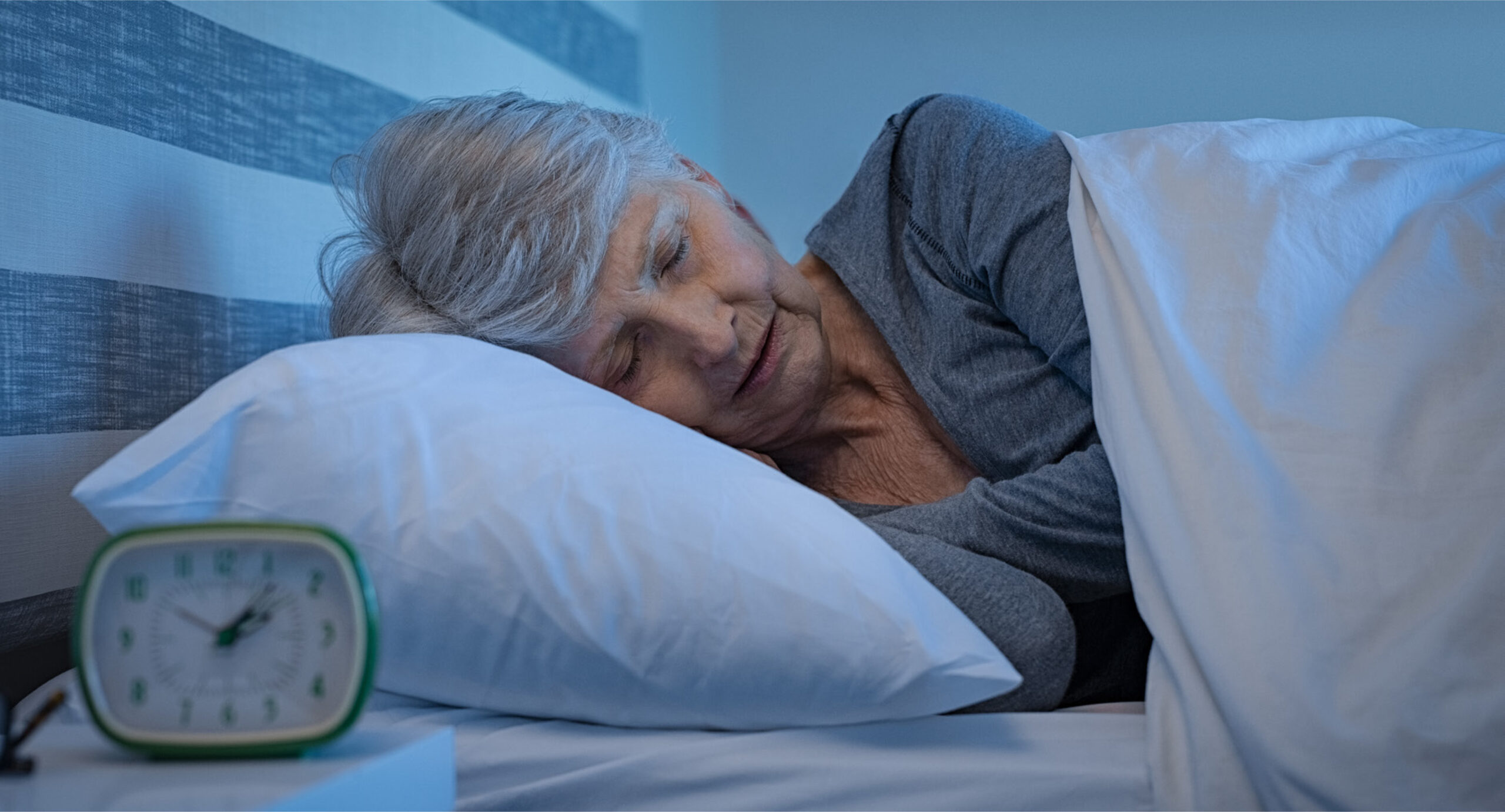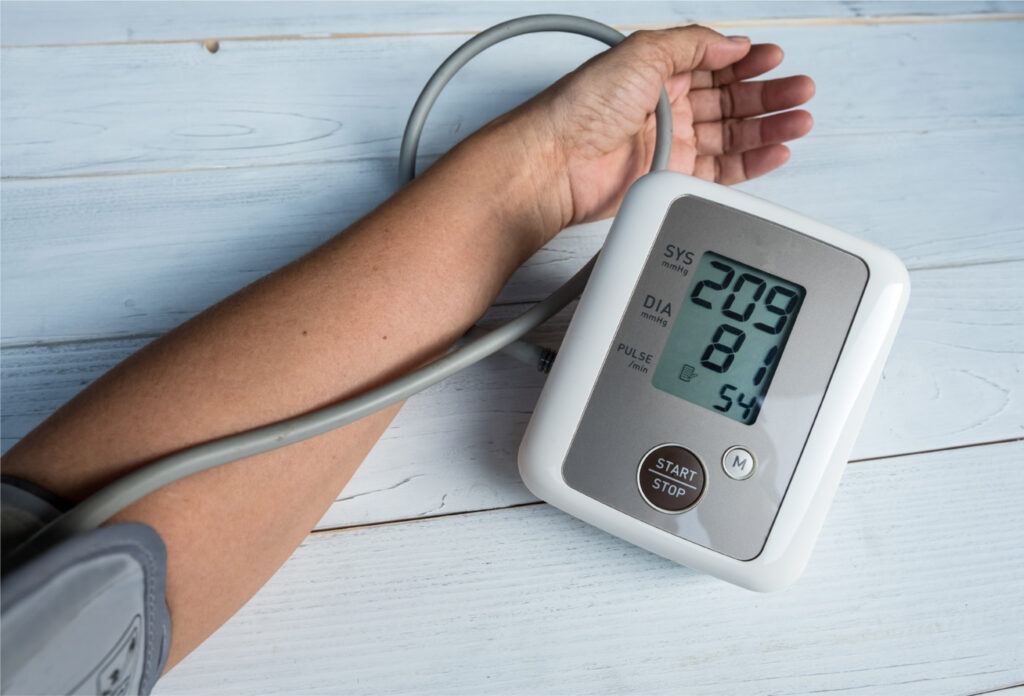Consistent, quality sleep is important for maintaining a healthy weight. Three weight loss professionals tell you why.

Sleep–or lack of it–can have wide-ranging impacts on how your body functions. Without sleep, your body can’t always regulate the hormone and energy systems that play an integral role in your health.
The Reviews Team at the National Council on Aging asked three qualified professionals to contribute their perspectives on sleep’s role in weight loss and overall health: Chris Kacyon is the Department Head of the Health and Fitness Science Department at Wake Technical Community College in Raleigh, North Carolina, and former physiologist at Duke Lifestyle and Weight Management Center in Durham, North Carolina; Katie Rickel, PhD is a clinical psychologist and Chief Executive Officer of Structure House, a residential weight management facility in Durham, North Carolina; Ann Kriebel-Gasparro, DNP is president-elect of the Gerontological Advanced Practice Nurses Association
Sleep regulates two important hormones that influence appetite: ghrelin and leptin. Ghrelin tells your body it’s hungry, while leptin tells it you’re full.
Inadequate sleep disrupts these hormones. Short sleep duration increases ghrelin levels and decreases leptin levels. That means you feel more hungry throughout the day, but you’re less likely to feel satiated.
Increased hunger isn’t necessarily associated with bigger, more frequent meals. Instead, it’s associated with snacking. Research showed people who sleep less tend to snack on high-carbohydrate foods (like sugary sweets) to find more energy during the day. “Foods with high sugar content lead to a higher risk of diabetes. Lack of sleep, poor dietary decisions, and obesity are directly related,” says Kacyon.
One large two-year study of 810 people (average age of 50 years) showed that sleep can predict weight loss success. Over a six-month period, those with self-reported sleep disturbance had less success losing weight and kept a higher fat percentage compared to those who reported sleeping an adequate amount. Other studies agree that sleep deprivation is associated with more fat deposits, particularly around the torso.
One of the main reasons people store more body fat in response to sleep deprivation is higher levels of ghrelin and an increased appetite, but the two-year study suggested there are underlying reasons related to how the body releases and uses energy in a fatigued state. High ghrelin levels promote fat creation and storage in the body. While this is a normal process to turn food into stored energy for our daily activities, high ghrelin levels due to sleep deprivation could interfere with healthy amounts of fat storage and production, but scientists don’t fully understand this link yet.
The same large two-year study also found that sleep deprivation negatively affects weight maintenance. Those who self-reported sleep deprivation but lost fat were more likely to regain it. Regained fat is likely due to increased appetite and snacking, but other underlying reasons remain unclear.
Sleep has a major influence on your body’s energy production processes, also known as metabolism. A poor night’s sleep can throw off your body’s circadian rhythm, which is responsible for regulating hormones that influence your energy metabolism, including how you process glucose (sugars) and cholesterol (fats).
 One of the most common metabolic disorders associated with poor sleep is type 2 diabetes, a chronic condition that affects how the body processes glucose. Research found that every hour of sleep deprivation per night was associated with a 14 percent higher prevalence of type 2 diabetes. Those with high sleep variability (lack of consistent sleep duration) combined with less than five to six hours of sleep per night have more blood sugar while fasting and a shockingly high 62 percent prevalence of type 2 diabetes.
One of the most common metabolic disorders associated with poor sleep is type 2 diabetes, a chronic condition that affects how the body processes glucose. Research found that every hour of sleep deprivation per night was associated with a 14 percent higher prevalence of type 2 diabetes. Those with high sleep variability (lack of consistent sleep duration) combined with less than five to six hours of sleep per night have more blood sugar while fasting and a shockingly high 62 percent prevalence of type 2 diabetes.
It’s no secret that adequate sleep gives you energy during the day, but how? As you slumber, your body cycles through sleep stages, each with its own purpose. One of the last stages, known as deep sleep, is when the body is most active in rebuilding itself. During this time, your body repairs muscles, activates the immune system, and regulates energy production. The Institute for Functional Medicine suggested that sleep may regulate energy production by influencing a cellular structure called the mitochondria, although it’s only seen this in animal models so far. This structure converts energy from our food into energy our body can use. Sleep deprivation may negatively impact this process, contributing to sluggish body function and disease.
Sleep plays a major role in regulating emotions. Adequate sleep and dreaming allow us to store experiences into our memory and process positive and negative feelings.
A review of more than 90 studies highlighted emotional and cognitive issues, including mood disorders, as short-term consequences of sleep deprivation. Over time, this can evolve into depression or other stress-related disorders, often characterized by a loss of interest and motivation to participate in activities like exercise. Unfortunately, many links exist between depression and weight gain due to metabolic disturbance and inflammation, but sleep can help combat these issues.
Medical Conditions And Sleep
Obesity often coincides with medical conditions that negatively impact sleep quality and quantity.
Kacyon says people with obesity have a higher risk of developing sleep apnea. Excess fat deposits can narrow the airway, making it difficult to breathe. At night, this looks like snoring, pauses in breathing, and sporadic waking—all of which contribute to a poor night’s sleep. Doctors often recommend elevating the head of the bed or using a continuous positive airway pressure (CPAP) machine to open the airway during sleep. But if you suspect you may have sleep apnea, you should talk to a doctor first.
Those with obesity have a higher prevalence of restless legs syndrome. This condition is associated with sleep apnea, depression, and other chronic conditions negatively impacting sleep. A study from the Journal of Clinical Sleep Medicine underlines how modifiable lifestyle habits, like increasing physical activity and managing weight, can significantly reduce symptoms.
While lack of sleep increases the risk of developing diabetes, research has shown that having diabetes can impact sleep quality. Unique sleep-disrupting factors related to this condition include frequent urination, low blood sugar, and peripheral neuropathy. People with diabetes should ask their doctor about minimizing sleep disturbance, which can help regulate metabolism and prevent other obesity- and sleep-related conditions.
People with obesity are four times more likely to report pain than those who are not obese. Overweight status is also associated with at least 20 percent greater rates of recurring pain than normal weight status and increases with obesity levels up to 254 percent. Studies show disturbed sleep is significantly associated with obesity and pain, but regular physical activity can help.
 In the United States, 70 percent of those over the age of 65 have high blood pressure, which is highly associated with rates of obesity and poor sleep quality. Kacyon explains that you need uninterrupted sleep to let your body regulate your nerves, heart, and blood vessels.
In the United States, 70 percent of those over the age of 65 have high blood pressure, which is highly associated with rates of obesity and poor sleep quality. Kacyon explains that you need uninterrupted sleep to let your body regulate your nerves, heart, and blood vessels.
“When you struggle to get quality sleep, the body’s nervous system acts as if you are awake and ready to be active. This leads to heightened heart rates and blood pressure during cycles where they should be down-regulating,” Kacyon notes. High blood pressure is often a result of poor sleep rather than a cause, but it’s strongly associated with sleep-disrupting conditions, like sleep apnea.
Does Sleep Help You Lose Weight?
“Weight loss is strongly tied to a good night’s sleep,” adds Kacyon. Rickel agrees, reinforcing sleep’s role in hunger, energy, and mood regulation. Poor sleep habits may hinder successful weight loss, so incorporating sleep hygiene into your journey can help set you up for success.
Excess weight takes a toll on your mental and emotional health, and it’s hard to know what to address first. Optimizing your sleep schedule is a good first step in regulating the mind and body. Sleep plays a key part in regulating emotion and managing stress, which combats mental health disorders associated with weight gain, like depression. Rickel provided three tips to stay optimistic during your weight loss journey:
- Set goals around behaviors rather than outcomes: While we cannot directly control how much weight we lose and how quickly we lose it, we can directly control the behaviors that will eventually result in weight loss. Arrange to give yourself a reward when you have, for example, increased your step count by 1,000 by the end of the week, when you include a fruit or vegetable in every meal, or when you plan a full week’s worth of meals and stick to the plan. You can control these behaviors and feel proud of those accomplishments, even if the weight loss doesn’t show right away.
- Use repetition for your meals: Many people become stressed and may give up altogether when they buy into the notion that healthy eating needs to be complicated and requires hours of meal preparation. Research shows that people who use repetitive meal structures (for example, cycling through the same three breakfasts, three lunches, and three dinners) tend to lose more weight and stick to their plan. Don’t overcomplicate things.
- Find support: There are plenty of support groups available (often for free) for those on a weight loss journey. Overeaters Anonymous and TOPS (Take Off Pounds Sensibly) are two popular ones, but many universities, hospitals, and places of worship also offer these groups. People tend to do better on their weight loss journeys when they have support, so this is a great step.
Aligning Sleep With Diet And Exercise
Kacyon says that physical activity is important for regulating your sleep cycle, but it’s important to time exercise bouts—and diet—carefully. Exercise and food may positively or negatively influence your circadian rhythm and sleep patterns, so if you’re trying to align sleep with your weight loss routine, consider the following:
- When in doubt, move about: Engaging in any physical activity during the day is shown to regulate misaligned circadian rhythms. The American College of Sports Medicine (ACSM) and the CDC recommend adults engage in at least 150 hours of moderate-intensity exercise or 60-75 hours of vigorous-intensity exercise with two bouts of strength training every week. Breaking down these guidelines into 10–30 minute bouts of exercise can help you incorporate movement into your day.
- Perform vigorous exercises earlier in the day: Although you should incorporate exercise into your routine, Kacyon recommends scheduling vigorous activities for the morning. High-intensity exercise can elevate the heart rate and release stress hormones. This is a normal, healthy response to exercise, but it’s not ideal when trying to sleep.

- Eat a healthy breakfast: Aim to eat most of your daily calories at the beginning of your day. Opting for a large, high-protein breakfast and smaller subsequent meals improved blood sugar control in those with diabetes and can decrease your appetite for the remainder of the day.
- Opt for earlier dinners: Studies have shown that having dinner close to bedtime can make it difficult to fall asleep. Instead, schedule your dinner a few hours before sleep to allow your body to digest your food (and avoid nighttime heartburn). Consuming anything an hour or less before bed increases the likelihood that you’ll wake up during the night.
- Establish a regular meal pattern: Pick a consistent meal schedule and stick to it. Your eating pattern can influence your circadian rhythm, including your sleep and metabolic patterns. No study has established an ideal eating schedule, but it’s generally agreed that irregular eating patterns hamper weight loss.
Sleep Is About More Than Weight Loss
Optimizing your sleep schedule is an important part of a healthy lifestyle. Getting adequate sleep provides the energy to visit grandchildren or the motivation to be active in your community. Positive lifestyle changes improve your general health, regardless of your current weight.
Consistently good sleep is important for everyone’s health, but if your sleep schedule feels off-track, try addressing your sleep hygiene first.
Kriebel-Gasparro shares some advice that works for her patients. We also consulted the Journal of General and Family Medicine and the Sleep Hygiene Index (a clinical test that scores sleep hygiene practices) to develop a complete list of ways to improve your sleep:
- Set a routine: Go to sleep and wake up at the same time every day to get your body used to a consistent, predictable pattern.
- Avoid caffeine in the evening: Caffeine can make it difficult to fall asleep and may increase bathroom visits during the night. Caffeine disrupts sleep up to six hours after consumption, so avoid drinking coffee, tea, and soda in the afternoon.
- Eat regular meals: Schedule three meals daily with light snacks if you feel hungry, but avoid eating heavy meals before bedtime.
- Limit fluid intake before bed: If you need to use the bathroom often at night, avoid liquids (including alcohol) before you sleep and prioritize water intake in the morning instead. If you have heart or circulation problems, talk to your doctor before starting this practice, as it can influence these conditions.
- Put the electronics away: Screens emit blue light, which tricks your brain into reducing sleep hormone levels (melatonin), making it hard to fall asleep. Opt for other activities that better prepare you for sleep, like reading a book.
- Create a relaxing environment: Sleep in a dark, quiet bedroom with a temperature of about 75 degrees Fahrenheit. If your bed feels uncomfortable, consider changing your mattress or upgrading your bed frame to an adjustable base.
- Move often: Morning endurance exercise, like walking and swimming, improves the ability to fall asleep at night. But exercising to the point of sweating before bed may keep you awake.

- Go outside: Your brain uses daylight to regulate sleep patterns, so venture outdoors and get some sunshine.
- Calm your mind: If your mind is racing before bed, make a to-do list and manage it in the morning when you’re well-rested. If you need more support, consider talking to a therapist who can offer solutions.
- Keep a sleep diary: Not sure which sleep hygiene tip is most beneficial for you? Track your patterns using a sleep diary, including meals and physical activity, for at least a week.
How To Talk To Your Doctor About Sleep Issues
If you’re concerned about your sleep patterns but you’re not sure where to start, consider using your sleep diary as a way to collect information for your doctor. Then, you can work with your doctor to make improvements. Be sure to discuss the following, as they may reveal some clues:
- Your current medication regimen
- Family history of sleep disorders
- Your emotional and mental health status
- Trends in diet, exercise, and energy levels
- Smoking and alcohol intake
- Patterns in urination and bowel movements
If you need further guidance, ask if you should see a sleep specialist.
Bottom Line
Sleep may be a key component of weight loss. It can influence hunger and satiety, energy production, and motivation for physical activity. Getting a good night’s sleep is helpful for everyone. An adequate sleep schedule of seven to nine hours per night can maintain physical, emotional, and mental health.
If you’re concerned about your sleep schedule, discuss it with a medical professional. Your doctor can identify areas for improvement and point you in the right direction. OS
To learn more, go to ncoa.org
Key Facts
• In the United States, 41.5 percent of adults over 60 are living with obesity.
• 35 percent of American adults don’t get the recommended seven to eight hours of sleep.
• Adequate sleep duration and quality may help you lose and maintain weight.
• Studies show that restricted sleep affects hunger hormones, increasing your appetite and diminishing feelings of fullness.
• Lack of physical activity and poor diet interrupt our natural circadian rhythms, which limits weight loss success.
• Research shows that sleep deprivation may cause people to eat more snacks with a high carbohydrate content, like sugary foods.
Are you getting seven to nine hours of sleep every night? If not, you may be limiting your health potential, especially if you’re watching your weight. Sleep and circadian rhythms play key roles in regulating energy, hunger, and mood. Inadequate sleep has short- and long-term consequences on physical and mental health, so prioritizing sleep hygiene is critical to your overall wellness.






